I spent seven years lecturing without getting paid
I’m mature, knowledgeable enough to govern Kwara
By Ismail Omipidan
Professor Abubakar Olanrewaju Sulaiman is the Director-General of the National Institute For Legislative and Democratic Studies (NILDS). He was one of the ministers appointed during the twilight of former President Goodluck Jonathan’s administration in 2014. Like many of his colleagues, he must have hoped to retain his position after the 2015 presidential election. But fate had other plans. Jonathan lost the election, and his political camp was thrown into disarray. But Prof. Sulaiman stuck to his guns, as he withstood the test of loyalty and was everywhere offering explanations in defence of the Jonathan’s administration. In this interview with ISMAIL OMIPIDAN,, he spoke about that period, his travails and how he was denied a full-time employment at the University of Abuja because of where he came from.
You just turned 60. When you look back, what are the reflections you will like to share with us and our readers?
I think the most important thing, first, to me, is to see such a mileage of milestone as a God given endowment. It is a rare gift from God which is not easy to come by. And as such, I give thanks to God for such a mileage in life, that’s the most important thing first. I say so because not everybody that were born the same time live up to that age. So, when you have such a rare gift from God, I think it’s just normal to applaud God, glorify Him, thank him, appreciate him. And it’s not just spending those years in life that is important, that you spend such years in life with remarkable success and accomplishments, is worth thanking God for. People have lived for 60, 70 years, but when you ask the question, how have they utilised those years, they have nothing to say. So, I thank God, it has been a very a monumental journey. It has been very rewarding, very remarkable, growing up as a child, from cradle, passing through hurdles of education, from primary to secondary, and to university.
I thank God for the capacity to lead, the gut, God-given attributes, leadership attributes from secondary school you know, where I started from a main leader of a religious organisation, cultural organisation, to a union leader in the university, and then dabbling into partisan politics. I also recalled the attempt to make ends meet after university education, carrying load on my head to sell at the Jos main market, the hurdles of trying to survive, contest for elections, local government election in the early 90s, and just three days to the primary, the military struck, and shattered hopes and aspirations. And then, trying to get back to the academia again to complete my master’s degree, coming out of the master’s, having obtained my degree, and then began to look for a job.
And then, my uncle asked me to come and head his outfit in Abuja. And one year after that, that uncle died, I had nowhere to go again. Luckily enough, a former lecturer of mine asked me to do part time work while I was doing my PhD. I started the part time work, and did the PhD for six years, as against four years or three years, not because I was not hardworking, but because they believe I shouldn’t graduate. Few years after starting the PhD, that same lecturer of mine, my mentor, gave up the ghost, and that made me to now spend seven years as a part time lecturer without a penny to myself, driving from Maitama to Gwagwalada every day. And in the course of my lecturing, I was privileged to teach the former governor of Kogi State, Ibraham Idris, Senators Natasha and Olujimi and a host of others.
As at today, I have five students in the current senate. I taught all these senators when I was a part- time lecturer and not getting a dime as remuneration. And at the time I was a part-time lecturer, in the same department, rather than confirming my appointment, they were bringing in some other people from other places, you know, ethnic dissents, because they believe I’m not part of them.
So, when and how did you eventually get a full-time employment with the University of Abuja?
I got a confirmation of my appointment seven years after, through the interventions of the then Vice Chancellor Nuhu Yakub of blessed memory. After his tenure, another Vice Chancellor took over, who messed up the university, that’s Adelabu. We clashed, and he tried to persecute me through his aides. My life was put online. I almost lost my life in the course of that. And when it got to the level of attack on my life through the aides of the then Vice Chancellor, I had to petition the Inspector General of Police who summoned him, and that put me in a serious crisis with him. He eventually retaliated by setting up a committee to try me for an offence committed 13 years earlier, which was a celebrated case, that is Sulaiman Abubakar versus V.C UniAbuja and seven others, in the year 2012. I approached the court in that celebrated case, and I became a persona non grata in the university, courses were taken away from me. I became a leper. All eyes were on me as a rebel in the university. The committee could not sit again, because I approached the court. I was in those travails when I was pronounced Minister of Budget and National Planning. I was appointed a minister while I was in court against the university.
I was a minister just for one year as Goodluck Jonathan government was terminated on account of the loss of the 2015 election. And after Buhari government took over, Jonathan’s ministers were subjected to a lot of persecution, I think one remarkable thing I achieved was that, while everybody was trying to shy away from confronting the Buhari’s government, to put some things in proper perspective, as that government was trying to misrepresent, and perhaps even portray the Jonathan government as a corrupt government trying to change some history, I was everywhere providing a counter narrative. So, that again brought me at loggerheads with the Buhari government, as I was addressing the press, granting interviews, and I became the darling of the journalists. So, the government of the day was not comfortable with that position. Efforts to silence me proved abortive. Eventually, I landed in detention. In 2016, they filed something against me, you know what they call a phantom allegation, yes, they did. The celebrated case, Belgore and Suleiman, I was in detention for almost two weeks in Lagos, and that commenced another travail in court again, my second leg in court which lasted for three and half years.
Again, I was in court when I was appointed the DG of this place. That’s the parallels of my life. And since that time, I’ve done what nobody thought I would do in terms of taking this place to a level it is today. I think that summarises my reflections.
It seems as if you get your appointments or recognition most times when you are on trial. What will you say has been the principle that has guided you so far?
Leadership is not about titles or tenure but about impact, integrity, and the courage to serve with conviction. My philosophy is simple. If I believe in something, I pursue it, regardless of resistance or challenges and discomfort. I’m always very steadfast, very focused, I’m very committed to anything I believe in. So, when I set for myself an agenda, I go for it, and so long as I set an agenda for myself, the goal is where I want to go. I don’t look at all these centrifugal forces that are trying to pull people down. I remain focused, dogged, steadfast, and pursue it, regardless of what might go against me. This is because ultimately, either you pull me down or don’t pull me down, either you support me or don’t support me, I believe that what God has destined for me will come to pass. I am a believer in Allah. My belief is strong, and I also have a very strong conviction. When I’m convinced about anything, I go for it, and that is why there’s no time I bother about some mediating forces of facture trying to work against it. The truth is, nothing comes to me so rosy.
You know, look at my appointment as a lecturer. How many lecturers in Nigerian University spent seven years as part-time lecturer, driving 120 kilometres in a day, rose to being the department exam officer. Taught all these big people in the country. How many in Nigeria?
Imagine the day I was to be screened by the senate, just few days to my appearance, they invited me to another room and said, ‘ministerial nominee, I think there is a problem. We just got a petition against you.’ If you were the one, just imagine what will creep into your mind. But again, I crossed that hurdle, too.
In fact, before I could get nominated as a minister, twice, they had to drop my name. Another long story, but I survived. So, the point I’m making is that once I set my mind on certain things, I have that strong belief that it will work, and regardless of nuances, I go for it, that’s my philosophy.
What specific reform or initiative would you say you have introduced to the institute that has impacted on Nigeria democratic and legislative processes?
You see, I have a lot of reforms and changes that we have introduced here. The major one is the reform about the manpower of the institute. The staff structure, to me, is the major one. You see this institute has a mandate. We have a goal; we have a target. Our objective is to enhance the capacity of democratic institutions in the country and by extension, the West Africa sub-region. Our mandate is to hone the scale of the parliamentary staff and the parliamentarians. We can’t actualise that mandate, if the productivity or the motivations or the welfare of staff, is not well addressed. So, one of the major reforms I brought onto the Institute, which remain very, very impactful, is human capital development, in the areas of capacity building. The staff are expected to train principal; they have to train our clients. But they too, they were not trained. That’s number one.
Two, the environment was not conducive in terms of motivation, in terms of work ethics, in terms of, you know what they call a reward system. The career progression became an issue, as quite a lot of them were not even promoted. Stagnations of career was an issue. So, the staff for 7, 8 years were on the same level. And even the pregnant woman, are not sure of maternity leave, nothing like sabbatical here as a tradition. So, the first thing I did was to address these challenges.
Before I came on board, most of the training activities and programmes were outsourced to lecturers outside, to consultants. Even the master’s and post-graduate programmes where we run master’s and PhD, were outsourced, most of the staff are not teaching, even some bills and motion drafting, before I came over, were done by consultants. I have stopped all those things. I develop the capacity of my staff. We brought in new staff. We mentored the old ones. We sent them on international training, not just national, international training, all of them, all within my first four years. So, now, when you have this kind of work environment, motivation, train the trainers programmes, automatically, it will impact on their productivity, their output. Today, we’ve talked about landmark legislation, go back to the national assembly, go and look at the legacy report of that assembly. Substantial numbers of those bills are acts emanating from this institute, and they did not emanate from the output or the input of consultants, but from staff of this institute.
Again, during the lockdown, we were one agency in this country that came out with measures and mechanism towards exiting the lockdown. Thirdly, before I came on board, NILDS was not known much at the sub national level, but I can tell you that the last six years, we have covered almost 32 state Houses of Assemblies, in terms of training, in terms of workshop in terms of most of these things were done by staff of this institute. And that is why today, the Institute is not just an intellectual hub of Nigerian legislature, but even for West African legislature. Just last week, the Ghanaian people were here. Maybe next week or so, we’re expecting Liberia, the Somalia have been here on several occasions, and even Uganda too. We have signed an MOU with Benin Republic for three years to train their parliamentarians and parliamentary staff. I think we are starting next week or so. That is where we are today. So, the Institute in the last two and a half years have commenced what you call legislative drafting internship for young graduates, to groom young drafters in the country, because we observe the drought of drafters in West Africa generally. We are the only one in Nigeria that has been doing that in the last two and a half years. All these things are done by this in-house staff of this institute. That’s why I say if we want to talk about where we are and how this has really impacted on the decisions and good governance, it will take a whole lot of 24 hours, to start cataloguing them.
Two books were presented to the public in your honour. What are the messages you were trying to pass?
I did not write the books; my staff and some other people wrote the book, even though I guided them. I wasn’t the author, It’s under my supervision, under my mentorship, and they wrote it because they believe they need to document my stewardship and one of the books has to do with transformational leadership, trying to look at my journey so far, how we started, how I was appointed, the intrigues of my appointment, the power play at the national level, how I survived the intrigues because when I took over here too, there were a lot of obstacles. Even when I was rounding off my first term here, people wrote me off that I am not coming back again. And there was this jostling for power, even within my aides believing that as long as Suleiman is still disposed to this party, they will not retain him. But to the glory of God, I was reappointed two months to the expiration of my first term. In fact, the book goes into precision about where I met the institution and where I am taking it to, in terms of management and lifetime achievements. I think that’s what the first book is all about.
The second book was all about my biography, talking about my childhood, education, family, and the journey of my life, my scholarship in the university of Abuja, the travails, my activism as an ASUU person, my appointment as the minister, my achievement as a minister within a year, and my appointment as the DG of the NILDS. Most importantly, they devoted some pages to some kind of eulogy or tribute from prominent Nigerians, including the vice president of the Federal Republic of Nigeria. In all, about 60 of them wrote tribute in my honour. The former President Goodluck Jonathan, Senate President Godswill Akpabio, selected governors, royal fathers and others. It talks about what people learn from me.
What advice would you offer to current and aspiring public servants on ethical leadership and the true essence of national service?
As a public servant, let us do the right thing while in service. We must be daring enough to do the right thing regardless of the position we found ourselves. You must uphold national interest. Nigeria project should be top most of your primary focus. We should all be guided by the nitty gritty of national values. As a public servant, you are under a lot of pressure, from home, work place, family and friends, a lot of interferences. But the guiding philosophy should be that whatever you want to do must be in the interest of the nation. If it’s not in the interest of the country, don’t do it, regardless of what people will say. That is why if you look at my travails, I have problem with people at the top, because some of us are very daring, insisting on doing what is right.
As you look into the future, how would you like to be remembered?
I want to be remembered as a teacher, already I am missing the class. Although, my next move is to go back to politics, and that will not take time. Very soon, I will be back to politics and my next move is to lead my state, all things been equal.
At least now, with the work I do here, I have knowledge of parliamentary practices, through my interaction with legislature. I observe it is one enterprise you must learn. Even if you are a professor, you must still learn it. So, if I am not here, even as a professor of a Political Science, I wouldn’t have known anything, like the parliamentary procedure and how it works, the politics, intrigues in the parliamentary palace and the enormous power so to speak and how the executives could impeach on that power.
For instance, I can’t be the governor of my state now and the relationship with the legislature will be a problem for me. If I have gotten it in 2019 perhaps, it could have taken me years to understand but now, I have mastered it. I’m relating with quite a lot of parliamentarians at the sub-national level in Nigeria. I’m relating with Senators and members of the House of Representatives; I’ve become part of them. So, I’ve learnt a moment of executive by being a minister and I have now grappled with that of legislature and I’ve been so much with the judiciary by the virtue of being the DG of NILDS, I think I am total, I am absolute, I possessed the rudimentary knowledge to navigate the murky water of administration at the state level. Nobody in my state Kwara have such loaded attribute as me.

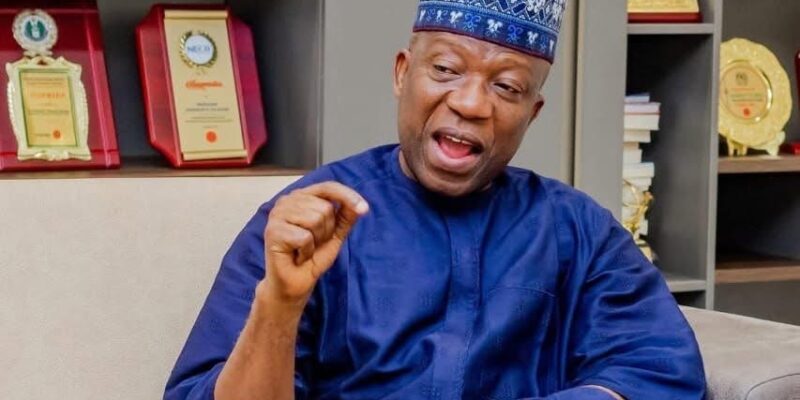

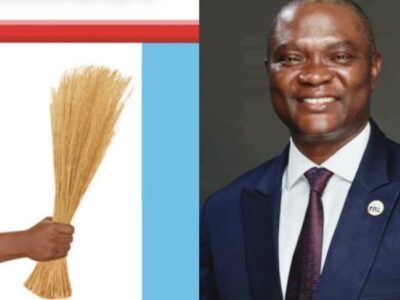
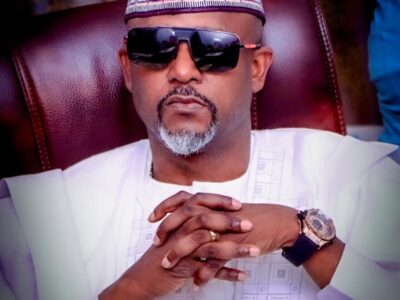
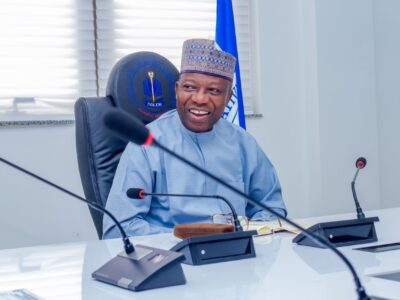


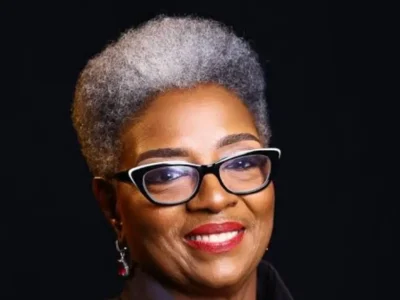

Comments